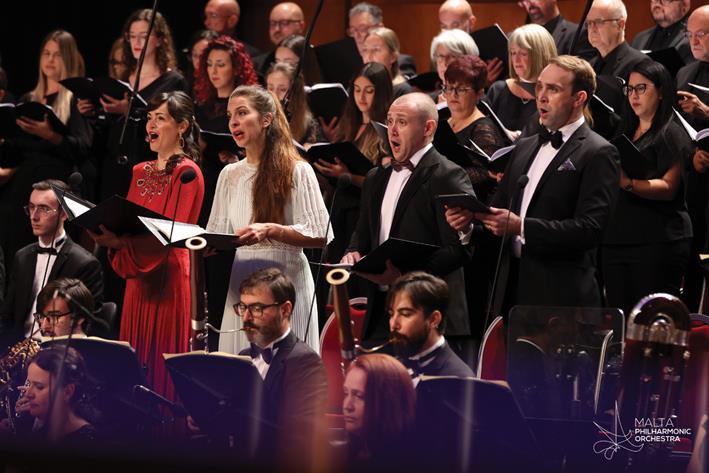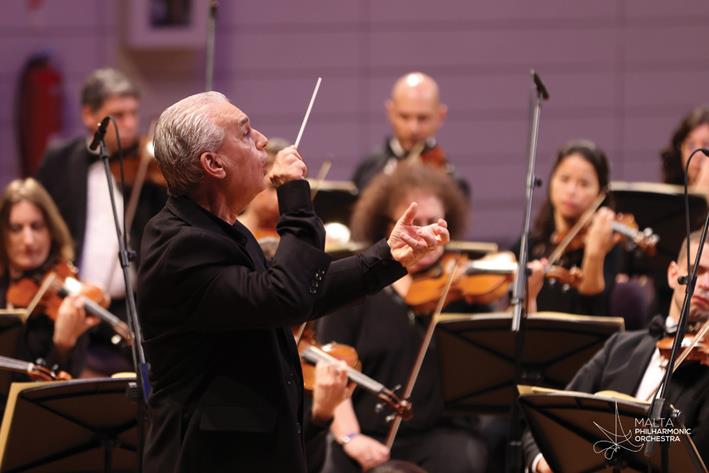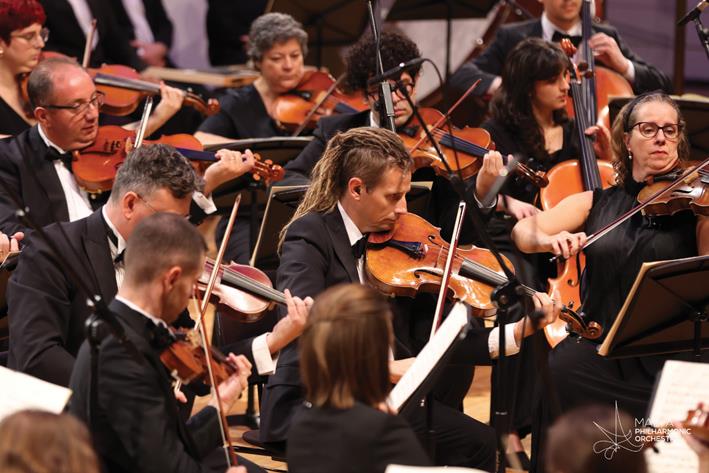I am very wary of those stairs in the dress circle, at the Mediterranean Conference Centre as I had fallen twice and each time I was battered and bruised considerably. Then there is the utter embarrassment of finding yourself sprawling in the most undignified manner.
So, my tickets are always in the back row or the one in front of it where I don't have to navigate any stairs at all.
The sell-out concert of Beethovan's 9th Symphony on 3rd November was in the morning. This was organised by the Malta Philharmonic Orchestra and conducted by Maestro Michael Laus.

I arrived too late for the pre-concert talk at the Sagra Infermeria by Maestro André Paul Huber.
The attendance was of a 100-strong audience - many more than expected, had the opportunity to be introduced to the 9th Symphony.
I asked Maestro Huber to tell me briefly what his talk was about. As a composer, he has had works performed in Malta, Italy and Sweden in various concerts and festivals. He kindly collaborated.

"A brief introduction about Beethoven's compositional approach was given, particularly emphasising how the composer kept researching for the best and optimal musical solution during the sketching process. The compositional process was a crucial point for Beethoven to an extent that any change made to any thematic material, would be carried out in relation to the whole composition being undertaken. Key milestones characterising the growth of the Symphonic genre in Beethoven's hands were explored, leading to the 9th Symphony and it was highlighted why this work was such a milestone in music history. The orchestra used by Beethoven in the 9th Symphony was explored and how this eventually influenced the music of the Romantic period, particularly in German composers.

A particular emphasis was given to Beethoven's own personal experience in organising the Akademie to produce the premiere of the 9th Symphony. The challenges faced by the composer in finding a suitable hall, musicians of adequate technical capabilities, organisational, as well as musical challenges were not indifferent. Reading through biographical notes of the events in preparation for the Akademie, it is easy to associate the challenges faced nowadays with the ones faced by the great composer.
During the preparations for the premiere of the 9th Symphony, Beethoven felt estranged in the city of Vienna, which had hosted and celebrated him for so many years.
He was only allowed two rehearsals for the premiere. After all we realise that nowadays realities are not far off from Beethoven's own challenges to perform this grand composition."
Thank you Maestro.

Symphony No. 9 in D minor, the Choral symphony, is arguably the greatest symphony ever composed: the summit of Beethoven's achievements, a masterful musical celebration of the human race and a massive work that makes all who hear it feel better about life. And yet, Beethoven himself never actually heard it. By the time his Symphony No 9 was premiered on 7 May 1824, he was profoundly deaf. The man who had done more than anyone before him to change the way we hear music had become one for whom sounds could no longer exist - and the bitter irony of this was not lost on him. Despite his deteriorating hearing, though, Beethoven persevered with writing this mammoth symphony. Encouraged no doubt, by his status as the composer of the moment, he penned a colossal work. But when Beethoven conducted its premiere he was famously unaware of the rapturous response his Ninth Symphony received. It took one of the musicians to alert him to the cheering audience - and that was only at the end of the second movement.
As we all know by now Symphony No. 9 is famous for its setting of Friedrich Schiller's poem Ode to Joy - a text the composer had been fascinated with for over twenty years: 'Mercy from the final judge! The dead shall live! Brothers drink and chime in, all sinners shall be forgiven and hell shall be no more!" Triumphant words that perfectly match the power and scale of Beethoven's immortal music.
He died of cirrhosis of the liver - according to the autopsy after his death. How can we blame him for drinking too much vino tinto under the trying circumstances of his life. This is the man who wrote the most famous four notes in the history of classical music (the 'da-da-da DAAAAH' at the start of Symphony No 5, in case you are wondering).
I am not going to comment on that morning's excellent performance. Maestro, Philharmonic orchestra, singers and choir were given a standing ovation which seemed to last forever. Even those with walking sticks persisted in staying upright. I know. I am one of them. Thank you very much all those who participated and also organised it. So many gifted people in Malta.
[email protected]